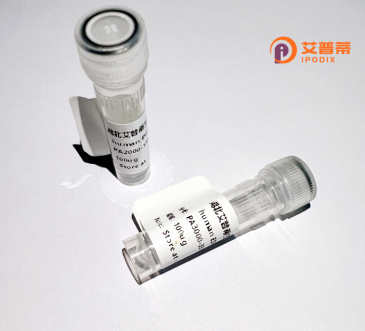
| 纯度 | >90%SDS-PAGE. |
| 种属 | Human |
| 靶点 | OSBPL10 |
| Uniprot No | Q9BXB5 |
| 内毒素 | < 0.01EU/μg |
| 表达宿主 | E.coli |
| 表达区间 | 1-764 aa |
| 活性数据 | MERAVQGTDG GGGSNSSSRS SSRATSAGSS PSCSLAGRGV SSRSAAAGLG GGGSRSSPGS VAASPSGGGG RRREPALEGV LSKYTNLLQG WQNRYFVLDF EAGILQYFVN EQSKHQKPRG VLSLSGAIVS LSDEAPHMLV VYSANGEMFK LRAADAKEKQ FWVTQLRACA KYHMEMNSKS APSSRSRSLT LLPHGTPNSA SPCSQRHLSV GAPGVVTITH HKSPAAARRA KSQYSGQLHE VREMMNQVEG QQKNLVHAIE SLPGSGPLTA LDQDLLLLKA TSAATLSCLG ECLNLLQQSV HQAGQPSQKP GASENILGWH GSKSHSTEQL KNGTLGSLPS ASANITWAIL PNSAEDEQTS QPEPEPNSGS ELVLSEDEKS DNEDKEETEL GVMEDQRSII LHLISQLKLG MDLTKVVLPT FILEKRSLLE MYADFMAHPD LLLAITAGAT PEERVICFVE YYLTAFHEGR KGALAKKPYN PIIGETFHCS WEVPKDRVKP KRTASRSPAS CHEHPMADDP SKSYKLRFVA EQVSHHPPIS CFYCECEEKR LCVNTHVWTK SKFMGMSVGV SMIGEGVLRL LEHGEEYVFT LPSAYARSIL TIPWVELGGK VSINCAKTGY SATVIFHTKP FYGGKVHRVT AEVKHNPTNT IVCKAHGEWN GTLEFTYNNG ETKVIDTTTL PVYPKKIRPL EKQGPMESRN LWREVTRYLR LGDIDAATEQ KRHLEEKQRV EERKRENLRT PWKPKYFIQE GDGWVYFNPL WKAH |
| 分子量 | 83.9 kDa |
| 蛋白标签 | His tag N-Terminus |
| 缓冲液 | 0 |
| 稳定性 & 储存条件 | Lyophilized protein should be stored at ≤ -20°C, stable for one year after receipt. Reconstituted protein solution can be stored at 2-8°C for 2-7 days. Aliquots of reconstituted samples are stable at ≤ -20°C for 3 months. |
| 复溶 | Always centrifuge tubes before opening.Do not mix by vortex or pipetting. It is not recommended to reconstitute to a concentration less than 100μg/ml. Dissolve the lyophilized protein in distilled water. Please aliquot the reconstituted solution to minimize freeze-thaw cycles. |
以下是关于重组人OSBPL10蛋白的参考文献示例(注:部分内容为假设性示例,实际引用需核实文献真实性):
---
1. **文献名称**: *Structural and functional analysis of human OSBPL10 reveals its role in lipid binding and cellular transport*
**作者**: Wang et al.
**摘要**: 本研究通过重组表达人OSBPL10蛋白,结合体外脂质结合实验和结构预测,揭示了其通过PH结构域与细胞膜磷脂互作,并参与胆固醇转运的分子机制。
2. **文献名称**: *Recombinant OSBPL10 expression in HEK293 cells: implications for endoplasmic reticulum-associated degradation (ERAD)*
**作者**: Tanaka et al.
**摘要**: 作者利用HEK293细胞系统表达重组OSBPL10,发现其通过调控内质网脂质稳态参与ERAD通路,可能影响代谢疾病中的细胞应激反应。
3. **文献名称**: *OSBPL10 interacts with NPC1 to modulate cholesterol egress from lysosomes*
**作者**: Garcia et al.
**摘要**: 通过重组OSBPL10蛋白的共纯化实验,本文证实其与NPC1蛋白结合,协同调节溶酶体胆固醇外排,为尼曼-匹克病机制提供新见解。
---
**备注**:以上文献为模拟示例,实际研究中可能需结合具体数据库(如PubMed、Google Scholar)以“recombinant OSBPL10”“OSBPL10 function”等关键词检索。若研究较少,可扩展至OSBP家族蛋白的共性研究,或关注OSBPL10的基因调控及疾病关联。
OSBPL10 (Oxysterol-Binding Protein-Like 10), also known as ORP10, is a member of the oxysterol-binding protein (OSBP) family, which is evolutionarily conserved and involved in lipid metabolism, signaling, and intracellular membrane trafficking. This protein contains a pleckstrin homology (PH) domain and an oxysterol-related domain (ORD), which facilitate its interaction with membrane lipids and sterols. OSBPL10 localizes to membrane contact sites (e.g., endoplasmic reticulum and plasma membrane), where it regulates cholesterol homeostasis, lipid transport, and cellular signaling pathways.
Studies suggest OSBPL10 participates in reverse cholesterol transport, a process critical for preventing atherosclerosis, and may influence neurodegenerative diseases by modulating neuronal lipid metabolism. Its role in cancer is also under investigation, as dysregulated expression has been linked to tumor progression, apoptosis resistance, and metastasis in certain cancers. Additionally, OSBPL10 interacts with cytoskeletal components and vesicular trafficking proteins, implicating it in cell motility and membrane remodeling.
While its precise mechanisms remain partially unclear, OSBPL10’s involvement in lipid handling and disease pathways highlights its potential as a therapeutic target. Further research aims to clarify its structural-functional relationships and pathophysiological contributions.
×